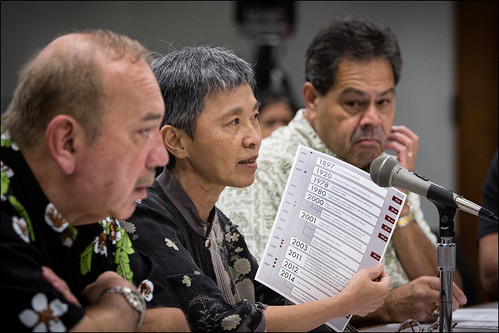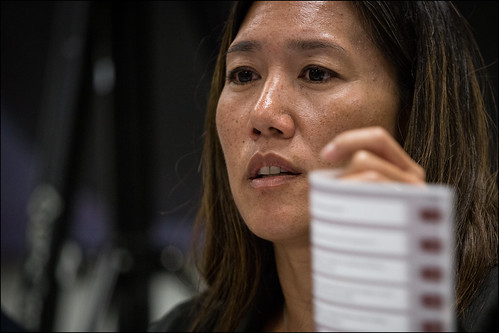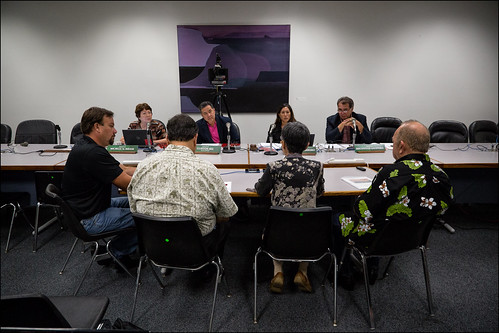UPDATED 05/06/14 5:05 p.m.
Members of the Native Hawaiian community are on track to establish a constitution for an independent Hawaiian nation as soon as next January.
UPDATED Representatives from the , a group charged with enrolling Native Hawaiians in a nation-building effort, told state lawmakers Monday that more than 130,000 people have signed up. The list includes about 80,000 names that were transferred from the Office of Hawaiian Affairs‘ Kau Inoa registry and Hawaiian registry, including hundreds who are deceased. For the past month, the office has conducted an aggressive that included newspaper advertisements, public hearings and social media outreach.
The commission, which was established by the Legislature with Act 195 in 2011 and began collecting names in 2012, finished its second round of registration May 1. The Senate Hawaiian Affairs Committee held an informational briefing Monday at the state Capitol to take stock of the group鈥檚 progress.
Norma Wong, a consultant for the commission who handled Hawaiian issues under former Gov. John Waihee, said the group plans to finish certifying its list by the end of June. That would pave the way for the group to elect delegates in September, hold a constitutional convention in October or November, and send the governing document back for approval by January.
After the list is certified, the commission will disband and the Office of Hawaiian Affairs will take over the effort to organize the elections and convention. Board members have the power to slow down the process if they choose, but Garret Kamemoto, spokesman for OHA, said there are currently no proposals on OHA鈥檚 agenda to change the schedule.
Drawing Comparisons to Akaka Bill

Norma Wong, consultant to the Native Hawaiian Roll Commission, answers questions about its progress and status to the Senate Committee on Hawaiian Affairs. Wong is shown holding up timeline of Hawaiian nation building efforts over the past 117 years.
Ultimately, the goal is to create a nation with its own laws separate from the United States that would be recognized by the federal government.
Former U.S. Sen. Daniel Akaka tried for more than a decade to achieve federal recognition for Hawaiians in Congress that would give the native community a status similar to Native American tribes. His proposal, known as the Akaka Bill, is not likely to pass anytime soon, given opposition from Senate Republicans and Akaka’s retirement.
Another option for federal recognition is through the Department of the Interior, which could confer tribal status with an executive order from President Barack Obama. Interior Secretary Sally Jewel said at a conference in Hawaii last fall that the Obama administration was “looking at different options to move on a path forward.”
With the Akaka Bill stymied in Congress, Hawaii lawmakers established the Native Hawaiian Roll Commission in 2011 in an effort to help develop an indigenous governing entity and support federal recognition of Native Hawaiians.
Wong said more than 80 percent of the 130,000 people who signed up for the roll live in Hawaii, including more than half of Hawaii鈥檚 Native Hawaiian adult population. But Native Hawaiians residing on the mainland are still underrepresented.
According to the 2010 U.S. Census, there are about 518,000 Hawaiians nationwide, including about Hawaiians living in Hawaii.
Even though registration is over, Wong emphasized that the roll may open again to include more people, and it doesn鈥檛 preclude others from participating in the nation in the future.

Senate Committee on Hawaiian Affairs Chair Sen. Maile Shimabukuro asks questions to the Native Hawaiian Roll Commission during informational briefing.
Hawaiian Affairs Committee Chairwoman Maile Shimabukuro said that she was surprised and pleased with the number of people who signed up, given all the criticism of the process that she has heard from constituents in her district. Many people doubt whether a nation-building process orchestrated by the state could truly result in an independent Hawaiian nation.
Kealii Makekau, a Native Hawaiian resident of Honolulu who is running for the Office of Hawaiian Affairs Board of Trustees, attended Monday鈥檚 briefing and said afterward that he thinks state lawmakers are giving the indigenous community false hope.
鈥淭his is a continuation of the Akaka Bill,鈥� he said. Many Native Hawaiians disapprove of that route because they want more independence from the federal government.
But members of the Native Hawaiian Roll Commission emphasized that this process is quite different than the Akaka Bill.
Commission Chairman Waihee said the Hawaii Legislature took an unusual step in passing Act 195, which acknowledged Hawaiians鈥� right to nationhood and anticipated the creation of an independent government by establishing the roll commission.
鈥淢ost of the time there is a governing entity first and then the conference of recognition,鈥� Waihee said. 鈥淚n this case really the Legislature set up an entirely new model.鈥�
He said the process is more similar to the formation of a labor union rather than the recognition of Native American tribes.
鈥淎ct 195 was really a stroke of genius,鈥� he said. 鈥淭he valiant effort of Sen. Akaka was really kind of yesterday’s news.鈥�
‘Non-Hawaiians Would Have the Opportunity to Become Citizens’

Members of the Native Hawaiian Roll Call Commission answer questions about their progress and status to the Senate Committee on Hawaiian Affairs.
Still, he and other commissioners and lawmakers acknowledged the organization may be vulnerable to legal challenges. The commission has been criticized as embodying racial discrimination by requiring each member of the roll to have Native Hawaiian ancestry.
The Supreme Court ruled in Cayetano v. Rice that the state couldn鈥檛 limit elections for the Office of Hawaiian Affairs, a state entity, to only people of Native Hawaiian descent. Commissioners are hoping that because Act 195 says Native Hawaiians may independently organize a convention, it won鈥檛 be subject to the same limitation.
Sen. Clayton Hee also said that limiting membership in the roll to Native Hawaiians doesn鈥檛 preclude citizenship in the new nation.
鈥淚t was always the intent that non-Hawaiians would have the opportunity to become citizens,鈥� Hee said.
Despite the risk of lawsuits and other hiccups, Waihee said he鈥檚 optimistic about the success of this attempt and that it鈥檚 long overdue.
鈥淚t鈥檚 the largest case of Native Hawaiians that have ever gotten together on self-government,鈥� he said, recalling a voting referendum in 1996. 鈥淲hat we鈥檙e doing now is in a real sense picking up where we left off.鈥�
State senators echoed Waihee鈥檚 optimism.
鈥淭he process needs to continue as ambitiously as stated,鈥� said Sen. Brickwood Galuteria. He likened signing up for the roll to jumping on a bus, referring to how more people will have the opportunity to participate in the future. 鈥淭he bus is moving. For everybody on the bus, good. The bus is going to stop again to let people on the bus.鈥�
An earlier version of this story mistakenly referred to Act 195 as Act 182.
Contact Anita Hofschneider via email at anita@civilbeat.com or on Twitter
 GET IN-DEPTH
REPORTING ON HAWAII鈥橲 BIGGEST ISSUES
GET IN-DEPTH
REPORTING ON HAWAII鈥橲 BIGGEST ISSUES
We need your help.
Unfortunately, being named a聽finalist for a聽Pulitzer prize聽doesn’t make us immune to financial pressures. The fact is,聽our revenue hasn鈥檛 kept pace with our need to grow,听.
Civil Beat is a nonprofit, reader-supported newsroom based in 贬补飞补颈驶颈. We鈥檙e looking to build a more resilient, diverse and deeply impactful media landscape, and聽we hope you鈥檒l help by .
About the Author
-
 Anita Hofschneider is a reporter for Civil Beat. You can reach her by email at anita@civilbeat.org or follow her on Twitter at .
Anita Hofschneider is a reporter for Civil Beat. You can reach her by email at anita@civilbeat.org or follow her on Twitter at .
